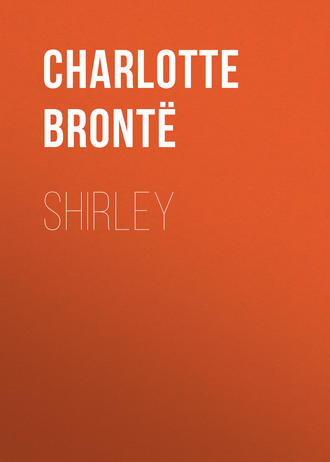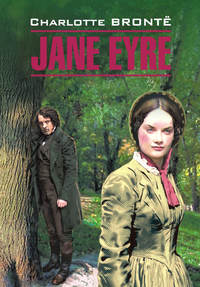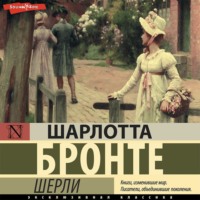 полная версия
полная версияShirley
"A shock of heaven and earth is felt – not by the slumbering city, only by that lonely watcher, brave and unshaken in his fanaticism. In the midst of silence, with no preluding sound, he is wrapped in sudden light. Through the roof, through the rent, wide-yawning, vast, white-blazing blue of heaven above, pours a wondrous descent, dread as the downrushing of stars. He has what he asked. Withdraw – forbear to look – I am blinded. I hear in that fane an unspeakable sound. Would that I could not hear it! I see an insufferable glory burning terribly between the pillars. Gods be merciful and quench it!
"A pious Argive enters to make an early offering in the cool dawn of morning. There was thunder in the night; the bolt fell here. The shrine is shivered, the marble pavement round split and blackened. Saturnia's statue rises chaste, grand, untouched; at her feet piled ashes lie pale. No priest remains; he who watched will be seen no more.
"There is the carriage! Let me lock up the desk and pocket the keys. She will be seeking them to-morrow; she will have to come to me. I hear her: 'Mr. Moore, have you seen my keys?'
"So she will say, in her clear voice, speaking with reluctance, looking ashamed, conscious that this is the twentieth time of asking. I will tantalize her, keep her with me, expecting, doubting; and when I do restore them, it shall not be without a lecture. Here is the bag, too, and the purse; the glove – pen – seal. She shall wring them all out of me slowly and separately – only by confession, penitence, entreaty. I never can touch her hand, or a ringlet of her head, or a ribbon of her dress, but I will make privileges for myself. Every feature of her face, her bright eyes, her lips, shall go through each change they know, for my pleasure – display each exquisite variety of glance and curve, to delight, thrill, perhaps more hopelessly to enchain me. If I must be her slave, I will not lose my freedom for nothing."
He locked the desk, pocketed all the property, and went.
CHAPTER XXX.
RUSHEDGE – A CONFESSIONAL
Everybody said it was high time for Mr. Moore to return home. All Briarfield wondered at his strange absence, and Whinbury and Nunnely brought each its separate contribution of amazement.
Was it known why he stayed away? Yes. It was known twenty – forty times over, there being at least forty plausible reasons adduced to account for the unaccountable circumstance. Business it was not —that the gossips agreed. He had achieved the business on which he departed long ago. His four ringleaders he had soon scented out and run down. He had attended their trial, heard their conviction and sentence, and seen them safely shipped prior to transportation.
This was known at Briarfield. The newspapers had reported it. The Stilbro' Courier had given every particular, with amplifications. None applauded his perseverance or hailed his success, though the mill-owners were glad of it, trusting that the terrors of law vindicated would henceforward paralyze the sinister valour of disaffection. Disaffection, however, was still heard muttering to himself. He swore ominous oaths over the drugged beer of alehouses, and drank strange toasts in fiery British gin.
One report affirmed that Moore dared not come to Yorkshire; he knew his life was not worth an hour's purchase if he did.
"I'll tell him that," said Mr. Yorke, when his foreman mentioned the rumour; "and if that does not bring him home full gallop, nothing will."
Either that or some other motive prevailed at last to recall him. He announced to Joe Scott the day he should arrive at Stilbro', desiring his hackney to be sent to the George for his accommodation; and Joe Scott having informed Mr. Yorke, that gentleman made it in his way to meet him.
It was market-day. Moore arrived in time to take his usual place at the market dinner. As something of a stranger, and as a man of note and action, the assembled manufacturers received him with a certain distinction. Some, who in public would scarcely have dared to acknowledge his acquaintance, lest a little of the hate and vengeance laid up in store for him should perchance have fallen on them, in private hailed him as in some sort their champion. When the wine had circulated, their respect would have kindled to enthusiasm had not Moore's unshaken nonchalance held it in a damp, low, smouldering state.
Mr. Yorke, the permanent president of these dinners, witnessed his young friend's bearing with exceeding complacency. If one thing could stir his temper or excite his contempt more than another, it was to see a man befooled by flattery or elate with popularity. If one thing smoothed, soothed, and charmed him especially, it was the spectacle of a public character incapable of relishing his publicity —incapable, I say. Disdain would but have incensed; it was indifference that appeased his rough spirit.
Robert, leaning back in his chair, quiet and almost surly, while the clothiers and blanket-makers vaunted his prowess and rehearsed his deeds – many of them interspersing their flatteries with coarse invectives against the operative class – was a delectable sight for Mr. Yorke. His heart tingled with the pleasing conviction that these gross eulogiums shamed Moore deeply, and made him half scorn himself and his work. On abuse, on reproach, on calumny, it is easy to smile; but painful indeed is the panegyric of those we contemn. Often had Moore gazed with a brilliant countenance over howling crowds from a hostile hustings. He had breasted the storm of unpopularity with gallant bearing and soul elate; but he drooped his head under the half-bred tradesmen's praise, and shrank chagrined before their congratulations.
Yorke could not help asking him how he liked his supporters, and whether he did not think they did honour to his cause. "But it is a pity, lad," he added, "that you did not hang these four samples of the unwashed. If you had managed that feat, the gentry here would have riven the horses out of the coach, yoked to a score of asses, and drawn you into Stilbro' like a conquering general."
Moore soon forsook the wine, broke from the party, and took the road. In less than five minutes Mr. Yorke followed him. They rode out of Stilbro' together.
It was early to go home, but yet it was late in the day. The last ray of the sun had already faded from the cloud-edges, and the October night was casting over the moorlands the shadow of her approach.
Mr. Yorke, moderately exhilarated with his moderate libations, and not displeased to see young Moore again in Yorkshire, and to have him for his comrade during the long ride home, took the discourse much to himself. He touched briefly, but scoffingly, on the trials and the conviction; he passed thence to the gossip of the neighbourhood, and ere long he attacked Moore on his own personal concerns.
"Bob, I believe you are worsted, and you deserve it. All was smooth. Fortune had fallen in love with you. She had decreed you the first prize in her wheel – twenty thousand pounds; she only required that you should hold your hand out and take it. And what did you do? You called for a horse and rode a-hunting to Warwickshire. Your sweetheart – Fortune, I mean – was perfectly indulgent. She said, 'I'll excuse him; he's young.' She waited, like 'Patience on a monument,' till the chase was over and the vermin-prey run down. She expected you would come back then, and be a good lad. You might still have had her first prize.
"It capped her beyond expression, and me too, to find that, instead of thundering home in a breakneck gallop and laying your assize laurels at her feet, you coolly took coach up to London. What you have done there Satan knows; nothing in this world, I believe, but sat and sulked. Your face was never lily fair, but it is olive green now. You're not as bonny as you were, man."
"And who is to have this prize you talk so much about?"
"Only a baronet; that is all. I have not a doubt in my own mind you've lost her. She will be Lady Nunnely before Christmas."
"Hem! Quite probable."
"But she need not to have been. Fool of a lad! I swear you might have had her."
"By what token, Mr. Yorke?"
"By every token – by the light of her eyes, the red of her cheeks. Red they grew when your name was mentioned, though of custom they are pale."
"My chance is quite over, I suppose?"
"It ought to be. But try; it is worth trying. I call this Sir Philip milk and water. And then he writes verses, they say – tags rhymes. You are above that, Bob, at all events."
"Would you advise me to propose, late as it is, Mr. Yorke – at the eleventh hour?"
"You can but make the experiment, Robert. If she has a fancy for you – and, on my conscience, I believe she has or had – she will forgive much. But, my lad, you are laughing. Is it at me? You had better grin at your own perverseness. I see, however, you laugh at the wrong side of your mouth. You have as sour a look at this moment as one need wish to see."
"I have so quarrelled with myself, Yorke. I have so kicked against the pricks, and struggled in a strait waistcoat, and dislocated my wrists with wrenching them in handcuffs, and battered my hard head by driving it against a harder wall."
"Ha! I'm glad to hear that. Sharp exercise yon! I hope it has done you good – ta'en some of the self-conceit out of you?"
"Self-conceit? What is it? Self-respect, self-tolerance even, what are they? Do you sell the articles? Do you know anybody who does? Give an indication. They would find in me a liberal chapman. I would part with my last guinea this minute to buy."
"Is it so with you, Robert? I find that spicy. I like a man to speak his mind. What has gone wrong?"
"The machinery of all my nature; the whole enginery of this human mill; the boiler, which I take to be the heart, is fit to burst."
"That suld be putten i' print; it's striking. It's almost blank verse. Ye'll be jingling into poetry just e'now. If the afflatus comes, give way, Robert. Never heed me; I'll bear it this whet [time]."
"Hideous, abhorrent, base blunder! You may commit in a moment what you will rue for years – what life cannot cancel."
"Lad, go on. I call it pie, nuts, sugar-candy. I like the taste uncommonly. Go on. It will do you good to talk. The moor is before us now, and there is no life for many a mile round."
"I will talk. I am not ashamed to tell. There is a sort of wild cat in my breast, and I choose that you shall hear how it can yell."
"To me it is music. What grand voices you and Louis have! When Louis sings – tones off like a soft, deep bell – I've felt myself tremble again. The night is still. It listens. It is just leaning down to you, like a black priest to a blacker penitent. Confess, lad. Smooth naught down. Be candid as a convicted, justified, sanctified Methody at an experience meeting. Make yourself as wicked as Beelzebub. It will ease your mind."
"As mean as Mammon, you would say. Yorke, if I got off horseback and laid myself down across the road, would you have the goodness to gallop over me, backwards and forwards, about twenty times?"
"Wi' all the pleasure in life, if there were no such thing as a coroner's inquest."
"Hiram Yorke, I certainly believed she loved me. I have seen her eyes sparkle radiantly when she has found me out in a crowd; she has flushed up crimson when she has offered me her hand, and said, 'How do you do, Mr. Moore?'
"My name had a magical influence over her. When others uttered it she changed countenance – I know she did. She pronounced it herself in the most musical of her many musical tones. She was cordial to me; she took an interest in me; she was anxious about me; she wished me well; she sought, she seized every opportunity to benefit me. I considered, paused, watched, weighed, wondered. I could come to but one conclusion – this is love.
"I looked at her, Yorke. I saw in her youth and a species of beauty. I saw power in her. Her wealth offered me the redemption of my honour and my standing. I owed her gratitude. She had aided me substantially and effectually by a loan of five thousand pounds. Could I remember these things? Could I believe she loved me? Could I hear wisdom urge me to marry her, and disregard every dear advantage, disbelieve every flattering suggestion, disdain every well-weighed counsel, turn and leave her? Young, graceful, gracious – my benefactress, attached to me, enamoured of me. I used to say so to myself; dwell on the word; mouth it over and over again; swell over it with a pleasant, pompous complacency, with an admiration dedicated entirely to myself, and unimpaired even by esteem for her; indeed I smiled in deep secrecy at her naïveté and simplicity in being the first to love, and to show it. That whip of yours seems to have a good heavy handle, Yorke; you can swing it about your head and knock me out of the saddle, if you choose. I should rather relish a loundering whack."
"Tak patience, Robert, till the moon rises and I can see you. Speak plain out – did you love her or not? I could like to know. I feel curious."
"Sir – sir – I say – she is very pretty, in her own style, and very attractive. She has a look, at times, of a thing made out of fire and air, at which I stand and marvel, without a thought of clasping and kissing it. I felt in her a powerful magnet to my interest and vanity. I never felt as if nature meant her to be my other and better self. When a question on that head rushed upon me, I flung it off, saying brutally I should be rich with her and ruined without her – vowing I would be practical, and not romantic."
"A very sensible resolve. What mischief came of it, Bob?"
"With this sensible resolve I walked up to Fieldhead one night last August. It was the very eve of my departure for Birmingham; for, you see, I wanted to secure Fortune's splendid prize. I had previously dispatched a note requesting a private interview. I found her at home, and alone.
"She received me without embarrassment, for she thought I came on business. I was embarrassed enough, but determined. I hardly know how I got the operation over; but I went to work in a hard, firm fashion – frightful enough, I dare say. I sternly offered myself – my fine person – with my debts, of course, as a settlement.
"It vexed me, it kindled my ire, to find that she neither blushed, trembled, nor looked down. She responded, 'I doubt whether I have understood you, Mr. Moore.'
"And I had to go over the whole proposal twice, and word it as plainly as A B C, before she would fully take it in. And then, what did she do? Instead of faltering a sweet Yes, or maintaining a soft, confused silence (which would have been as good), she started up, walked twice fast through the room, in the way that she only does, and no other woman, and ejaculated, 'God bless me!'
"Yorke, I stood on the hearth, backed by the mantelpiece; against it I leaned, and prepared for anything – everything. I knew my doom, and I knew myself. There was no misunderstanding her aspect and voice. She stopped and looked at me.
"'God bless me!' she piteously repeated, in that shocked, indignant, yet saddened accent. 'You have made a strange proposal – strange from you; and if you knew how strangely you worded it and looked it, you would be startled at yourself. You spoke like a brigand who demanded my purse rather than like a lover who asked my heart.'
"A queer sentence, was it not, Yorke? And I knew, as she uttered it, it was true as queer. Her words were a mirror in which I saw myself.
"I looked at her, dumb and wolfish. She at once enraged and shamed me.
"'Gérard Moore, you know you don't love Shirley Keeldar.' I might have broken out into false swearing – vowed that I did love her; but I could not lie in her pure face. I could not perjure myself in her truthful presence. Besides, such hollow oaths would have been vain as void. She would no more have believed me than she would have believed the ghost of Judas, had he broken from the night and stood before her. Her female heart had finer perceptions than to be cheated into mistaking my half-coarse, half-cold admiration for true-throbbing, manly love.
"What next happened? you will say, Mr. Yorke.
"Why, she sat down in the window-seat and cried. She cried passionately. Her eyes not only rained but lightened. They flashed, open, large, dark, haughty, upon me. They said, 'You have pained me; you have outraged me; you have deceived me.'
"She added words soon to looks.
"'I did respect – I did admire – I did like you,' she said – 'yes, as much as if you were my brother; and you – you want to make a speculation of me. You would immolate me to that mill, your Moloch!'
"I had the common sense to abstain from any word of excuse, any attempt at palliation. I stood to be scorned.
"Sold to the devil for the time being, I was certainly infatuated. When I did speak, what do you think I said?
"'Whatever my own feelings were, I was persuaded you loved me, Miss Keeldar.'
"Beautiful, was it not? She sat quite confounded. 'Is it Robert Moore that speaks?' I heard her mutter. 'Is it a man – or something lower?'
"'Do you mean,' she asked aloud – 'do you mean you thought I loved you as we love those we wish to marry?'
"It was my meaning, and I said so.
"'You conceived an idea obnoxious to a woman's feelings,' was her answer. 'You have announced it in a fashion revolting to a woman's soul. You insinuate that all the frank kindness I have shown you has been a complicated, a bold, and an immodest manœuvre to ensnare a husband. You imply that at last you come here out of pity to offer me your hand, because I have courted you. Let me say this: Your sight is jaundiced; you have seen wrong. Your mind is warped; you have judged wrong. Your tongue betrays you; you now speak wrong. I never loved you. Be at rest there. My heart is as pure of passion for you as yours is barren of affection for me.'
"I hope I was answered, Yorke?
"'I seem to be a blind, besotted sort of person,' was my remark.
"'Loved you!' she cried. 'Why, I have been as frank with you as a sister – never shunned you, never feared you. You cannot,' she affirmed triumphantly – 'you cannot make me tremble with your coming, nor accelerate my pulse by your influence.'
"I alleged that often, when she spoke to me, she blushed, and that the sound of my name moved her.
"'Not for your sake!' she declared briefly. I urged explanation, but could get none.
"'When I sat beside you at the school feast, did you think I loved you then? When I stopped you in Maythorn Lane, did you think I loved you then? When I called on you in the counting-house, when I walked with you on the pavement, did you think I loved you then?'
"So she questioned me; and I said I did.
"By the Lord! Yorke, she rose, she grew tall, she expanded and refined almost to flame. There was a trembling all through her, as in live coal when its vivid vermilion is hottest.
"'That is to say that you have the worst opinion of me; that you deny me the possession of all I value most. That is to say that I am a traitor to all my sisters; that I have acted as no woman can act without degrading herself and her sex; that I have sought where the incorrupt of my kind naturally scorn and abhor to seek.' She and I were silent for many a minute. 'Lucifer, Star of the Morning,' she went on, 'thou art fallen! You, once high in my esteem, are hurled down; you, once intimate in my friendship, are cast out. Go!'
"I went not. I had heard her voice tremble, seen her lip quiver. I knew another storm of tears would fall, and then I believed some calm and some sunshine must come, and I would wait for it.
"As fast, but more quietly than before, the warm rain streamed down. There was another sound in her weeping – a softer, more regretful sound. While I watched, her eyes lifted to me a gaze more reproachful than haughty, more mournful than incensed.
"'O Moore!' said she. It was worse than 'Et tu, Brute!'
"I relieved myself by what should have been a sigh, but it became a groan. A sense of Cain-like desolation made my breast ache.
"'There has been error in what I have done,' I said, 'and it has won me bitter wages, which I will go and spend far from her who gave them.'
"I took my hat. All the time I could not have borne to depart so, and I believed she would not let me. Nor would she but for the mortal pang I had given her pride, that cowed her compassion and kept her silent.
"I was obliged to turn back of my own accord when I reached the door, to approach her, and to say, 'Forgive me.'
"'I could, if there was not myself to forgive too,' was her reply; 'but to mislead a sagacious man so far I must have done wrong.'
"I broke out suddenly with some declamation I do not remember. I know that it was sincere, and that my wish and aim were to absolve her to herself. In fact, in her case self-accusation was a chimera.
"At last she extended her hand. For the first time I wished to take her in my arms and kiss her. I did kiss her hand many times.
"'Some day we shall be friends again,' she said, 'when you have had time to read my actions and motives in a true light, and not so horribly to misinterpret them. Time may give you the right key to all. Then, perhaps, you will comprehend me, and then we shall be reconciled.'
"Farewell drops rolled slow down her cheeks. She wiped them away.
"'I am sorry for what has happened – deeply sorry,' she sobbed. So was I, God knows! Thus were we severed."
"A queer tale!" commented Mr. Yorke.
"I'll do it no more," vowed his companion; "never more will I mention marriage to a woman unless I feel love. Henceforth credit and commerce may take care of themselves. Bankruptcy may come when it lists. I have done with slavish fear of disaster. I mean to work diligently, wait patiently, bear steadily. Let the worst come, I will take my axe and an emigrant's berth, and go out with Louis to the West; he and I have settled it. No woman shall ever again look at me as Miss Keeldar looked, ever again feel towards me as Miss Keeldar felt. In no woman's presence will I ever again stand at once such a fool and such a knave, such a brute and such a puppy."
"Tut!" said the imperturbable Yorke, "you make too much of it; but still, I say, I am capped. Firstly, that she did not love you; and secondly, that you did not love her. You are both young; you are both handsome; you are both well enough for wit and even for temper – take you on the right side. What ailed you that you could not agree?"
"We never have been, never could be at home with each other, Yorke. Admire each other as we might at a distance, still we jarred when we came very near. I have sat at one side of a room and observed her at the other, perhaps in an excited, genial moment, when she had some of her favourites round her – her old beaux, for instance, yourself and Helstone, with whom she is so playful, pleasant, and eloquent. I have watched her when she was most natural, most lively, and most lovely; my judgment has pronounced her beautiful. Beautiful she is at times, when her mood and her array partake of the splendid. I have drawn a little nearer, feeling that our terms of acquaintance gave me the right of approach. I have joined the circle round her seat, caught her eye, and mastered her attention; then we have conversed; and others, thinking me, perhaps, peculiarly privileged, have withdrawn by degrees, and left us alone. Were we happy thus left? For myself, I must say No. Always a feeling of constraint came over me; always I was disposed to be stern and strange. We talked politics and business. No soft sense of domestic intimacy ever opened our hearts, or thawed our language and made it flow easy and limpid. If we had confidences, they were confidences of the counting-house, not of the heart. Nothing in her cherished affection in me, made me better, gentler; she only stirred my brain and whetted my acuteness. She never crept into my heart or influenced its pulse; and for this good reason, no doubt, because I had not the secret of making her love me."
"Well, lad, it is a queer thing. I might laugh at thee, and reckon to despise thy refinements; but as it is dark night and we are by ourselves, I don't mind telling thee that thy talk brings back a glimpse of my own past life. Twenty-five years ago I tried to persuade a beautiful woman to love me, and she would not. I had not the key to her nature; she was a stone wall to me, doorless and windowless."









